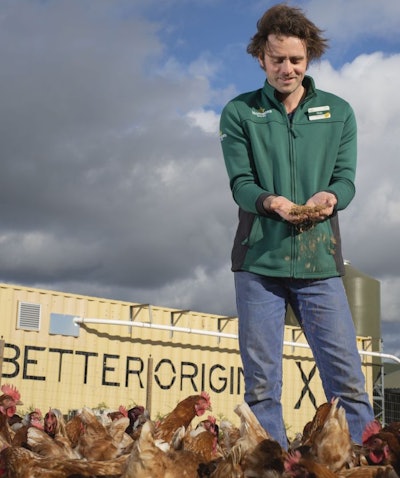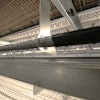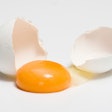
Own brand carbon neutral eggs will be launched by the U.K.’s fourth largest supermarket chain Morrisons next year following the installation small-scale insect farms at its laying facilities.
Morrisons is aiming to reduce the use of soya at 10 of its free-range egg farms as part of a plan to become the first U.K. supermarket to launch its own brand of carbon neutral eggs and has teamed up with insect farm producer Better Origin.
Better Origin’s container farms are said to be autonomous and produce black soldier fly larvae. Feedstock is delivered into the module and prepared to ensure that is free from harmful bacteria. The farm unit then processes and delivers the feed to the larvae.
And there is not a great deal for the egg farmer to do as Better Origin’s artificial intelligence system, Overmind, overseas feeding and the larvae’s health, so that nobody else has to.
Under the watchful eye of Overmind, the larvae will feast on waste from Morrisons’ own fruit and vegetable site, creating one of the U.K.’s first circular waste feeding schemes within the same company to produce food. Over 30 metric tons of fruit and veg waste will be recycled each week.
Each container can help to feed 32,000 free range-hens and will receive three metric tons of fruit and vegetable waste each week. Collectively, the 10 containers will feed 320,000 free range hens.
Fotis Fotiadis, CEO and founder of Better Origin, has said that he hopes that the initial rollout will scale across all of Morrisons egg farms which would remove 40,180 metric tons of CO2 equivalent from production each year.
Hens, however, cannot live by insects alone, however, so the supermarket chain will also feed its hens with a supplementary diet of U.K.-grown beans, peas and sunflower seeds.
How insects are helping
According to Morrisons, soya currently accounts for 10-20% of hens’ normal diets in the U.K. Up to 70% of the emissions from the U.K.’s egg supply chain is attributed to feed, of which soya is a major contributor.
Reducing soya, the company says, and feeding insects food waste on these 10 farms alone is expected to save 56 hectares of South America land from deforestation every year, where half of the world’s soybeans are currently farmed. It will also reduce CO2 emissions by 5,737 metric tons and save 40 billion liters of water annually.
The supermarket chain expects its carbon neutral eggs to be perched on shelves in 2022 and they will be followed by carbon neutral options for fruit, vegetables and meat in the years ahead.


















